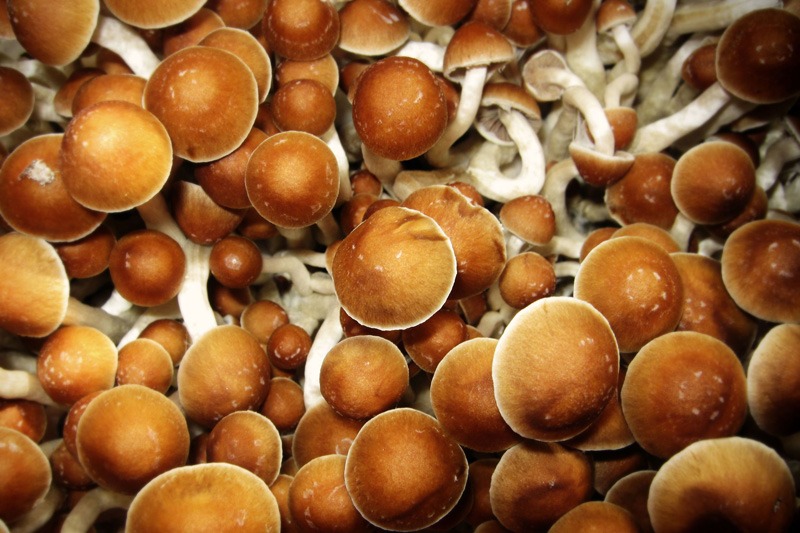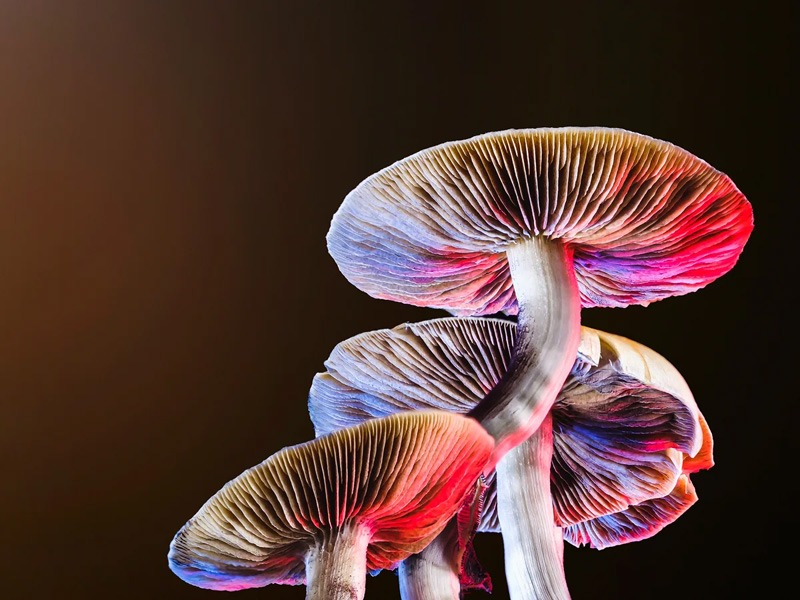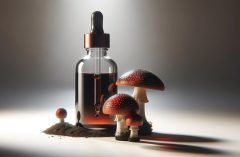Table of Contents
- 1 The Discovery of Psilocybin as a Treatment for Trauma
- 2 How Psilocybin Helps Re-Wire the Brain to Overcome Trauma
- 3
- 4 Recent Studies on Psilocybin for PTSD and Depression
- 5 What to Expect From Psilocybin-Assisted Therapy
- 6 Other Promising Uses for Psilocybin in Mental Health
- 7 The Current Legal Status of Psilocybin in the US
- 8 Future Research Needed on Psilocybin as Medicine
- 9 Finding a Licensed Psilocybin Therapist
- 10 Psilocybin FAQs: Should Magic Mushrooms Be Legal?
- 11 Conclusion
 The Discovery of Psilocybin as a Treatment for Trauma
The Discovery of Psilocybin as a Treatment for Trauma
Psilocybin mushrooms are natural organisms that produce the psychedelic compound psilocybin. In the 1950s, scientists began studying psilocybin and found that it could produce profound changes in perception, cognition, and mood. Initial studies showed psilocybin was remarkably safe and non-addictive when administered in controlled settings.
Reduced Symptoms of Anxiety and Depression
In 2016, researchers at Johns Hopkins University found that psilocybin significantly reduced symptoms of anxiety and depression in people with life-threatening cancer diagnoses. The results were striking—over 80% of participants showed clinically significant reductions in symptoms after a single high dose of psilocybin. These effects lasted for over six months for many patients.
New Connections in the Brain
Psilocybin appears to work by temporarily disrupting entrenched thought patterns and creating new connections in the brain. This “reset” effect seems to help people gain a new perspective on past or present trauma. Follow-up brain scans show psilocybin alters how different brain regions communicate with each other, specifically areas involved in emotion, memory, and sense of self.
Should Magic Mushrooms be Legal in the US?
While research into psilocybin is gaining momentum, psilocybin remains illegal as a Schedule I substance in the US, despite its promising therapeutic potential and relative safety. However, several US cities have already decriminalized magic mushrooms, and there are ongoing efforts to legalize psilocybin for medical use in select states. As research continues to demonstrate the psychological and spiritual benefits of psilocybin, legal access to this natural medicine may eventually become a reality.
How Psilocybin Helps Re-Wire the Brain to Overcome Trauma
Recent studies show psilocybin, the active ingredient in magic mushrooms, can help rewire the brain to overcome trauma. Psilocybin has been shown to increase connectivity between different brain regions, allowing people to form new neural connections that can help overwrite traumatic memories.
One study found two doses of psilocybin led to an over 60% decrease in symptoms of treatment-resistant depression. The effects lasted up to five weeks after the final dose. Another study found psilocybin decreased symptoms of anxiety and depression in cancer patients. The benefits were still seen four-and-a-half months after treatment.
Changing Brain Connectivity
Psilocybin has been shown to alter brain connectivity in regions involved in emotional processing, awareness, and memory. This can help people gain new insights into their trauma, change their perspectives, and find new meaning in life. With the guidance of a therapist, psilocybin-assisted therapy may be very effective for overcoming PTSD, depression, anxiety, and other trauma-related disorders.
What to Expect from Treatment
If psilocybin is approved as a treatment, you can expect to undergo therapy with a licensed professional. Initial and follow-up therapy sessions will help prepare you for the experience and integrate insights. During the dosing session, you’ll take a capsule containing a controlled dose of psilocybin and be closely monitored for 6-8 hours. The effects tend to be deeply personal and spiritual for many. You may gain a new perspective on yourself, your relationships, and life in general.
While more research is still needed, psilocybin shows promise as a treatment for trauma and other mental health conditions. Given the low risk of harm and abuse, psilocybin deserves to be explored as a legal and regulated mental health treatment in the US. For those suffering from PTSD, depression, anxiety, and other disorders, psilocybin may represent a light at the end of the tunnel.
Recent Studies on Psilocybin for PTSD and Depression
Recent research studies have shown promising results for using psilocybin, the active compound in magic mushrooms, to treat PTSD and depression. Psilocybin works by activating serotonin receptors in the brain that regulate mood and stress.
A study at Johns Hopkins found that psilocybin led to a significant reduction in depression and anxiety in cancer patients.
Participants reported the experience gave them a new perspective and connection to themselves, their loved ones, and the world around them.
Many people find psilocybin helps them gain insight into the root causes of their mental anguish and find meaning in their suffering. A follow-up study found that the positive effects lasted for at least 6 months in 83% of participants.
Another study at Imperial College London found psilocybin was effective at reducing symptoms of PTSD, including flashbacks, nightmares, and hypervigilance. Participants reported feeling less anxious, less depressed, and better connected to others after just two psilocybin sessions. According to some estimates, up to 30% of people with PTSD are resistant to conventional treatments like therapy and medication. Psilocybin could offer hope for those who have tried other options without success.
While not without risks, psilocybin is considered non-addictive and has a low toxicity profile. When taken in a controlled setting with psychological support, the benefits seem to far outweigh the risks for many. As research continues, psilocybin is gaining mainstream acceptance as a treatment for mental health conditions.
Several US cities have decriminalized magic mushrooms, and some are pushing for legal medical access.
In 2024, psilocybin will enter Phase 3 trials, the final step before FDA approval as a legal prescription treatment. If approved, medical professionals will be able to legally prescribe psilocybin for patients with PTSD, depression, and other conditions. Many see this as an exciting new frontier in psychiatry that could help millions find relief from their suffering.
Should magic mushrooms be legalized in the US to allow for their promising medical benefits? The research says there are good reasons to consider broader access to this natural treatment.
What to Expect From Psilocybin-Assisted Therapy
Pre-Treatment
Before beginning psilocybin-assisted therapy, you’ll meet with your therapists for an initial consultation. They’ll evaluate if you’re a good candidate for treatment based on your mental health and trauma history. If accepted into the program, you’ll prepare for the experience by discussing your intentions and establishing a trusting relationship with your therapists.
The Psilocybin Experience
During your psilocybin session, you’ll take a capsule containing a controlled dose of psilocybin in a comfortable, home-like setting with ambient lighting and music. Your therapists will guide you through the 6-8 hour experience, offering support and helping you work through difficult emotions or memories as needed. The psychedelic effects of psilocybin alter your perception and cognition, allowing you to gain new insights into your trauma.
Integration
In the days and weeks following your session, you’ll meet with your therapists for integration. This involves discussing your experience, new insights gained, and how they relate to your trauma. Your therapists can help make sense of your experience and apply the lessons learned to improving your mental health and daily life. Additional sessions may be needed to fully integrate the experience.
While psilocybin shows promise for trauma treatment, it does come with risks like anxiety, fear, and paranoia during the session. However, when used under medical supervision and with proper preparation and integration, psilocybin can be administered safely. If approved, psilocybin-assisted therapy may provide a new avenue for overcoming PTSD, depression, and other disorders related to traumatic life events.
Though still illegal for recreational use, medically-supervised psilocybin treatments are gaining mainstream acceptance and may receive FDA approval by 2024. Psilocybin has the potential to revolutionize mental healthcare and provide relief for millions suffering from trauma and psychological distress. The future is bright for psychedelic-assisted therapies.
Other Promising Uses for Psilocybin in Mental Health
Addiction Treatment
Recent studies show psilocybin can help treat addiction by changing unhealthy patterns of thinking and behavior. In one study, 80% of smokers quit after just one psilocybin session. The psychedelic experience helps people gain awareness and insight into their addiction, making it easier to break free. Psilocybin has shown promising results for treating alcoholism and opioid addiction as well. As the mental health field gains more experience with psilocybin, addiction treatment may become one of its most important applications.
Depression and Anxiety
For some people with treatment-resistant depression or anxiety, psilocybin provides relief when other options have failed. In clinical trials, over 60% of participants experienced significant reductions in symptoms after psilocybin treatment. The effects appear to last for months after the initial experience. Psilocybin helps people gain a new perspective, reconnect with a sense of meaning or purpose, and shift unhealthy thought patterns. More research is still needed, but psilocybin could be a game-changer for those suffering from chronic anxiety and depression.
End-of-Life Anxiety
A few small studies suggest psilocybin can help reduce anxiety in people with a terminal illness. The psychedelic experience often leads to feelings of peace, calm, and connection. This can help ease distress over death and dying, allowing people to find meaning in the time they have left. Though limited, the research on psilocybin for end-of-life anxiety is promising. As medical aid in dying becomes legal in more places, psilocybin may provide an additional option for comfort and relief.
Psilocybin is poised to transform mental healthcare. While more research is still needed, it shows enormous promise for treating addiction, depression, anxiety, and end-of-life distress. For those suffering from conditions that resist conventional treatment, psilocybin could provide life-changing relief and healing. The future looks bright.
The Current Legal Status of Psilocybin in the US
At the federal level, psychedelic mushrooms containing psilocybin are currently classified as Schedule I substances, meaning they are considered to have a high potential for abuse and no established medical use. However, some cities and states have decriminalized psilocybin or made it a low enforcement priority.
Oregon Leads the WayIn 2020, Oregon became the first state to legalize psilocybin for therapeutic use. Measure 109 legalized the manufacture, delivery, and administration of psilocybin at supervised, licensed facilities. Psilocybin services won’t be available until 2023, but Oregon’s move signals a shift in attitudes.
Calls for Federal Reform There have been calls for reforming federal policy on psychedelics. The proposed PSYCHEDELIC Act would reclassify psilocybin from Schedule I to Schedule IV, recognizing its medical potential. The bill remains stalled in Congress but has bipartisan support. The FDA has also granted psilocybin therapy a “breakthrough therapy” designation, expediting the development of new treatments.
What’s Next for Legalization? More cities and states are likely to decriminalize or legalize psilocybin in coming years. Several other states are considering psychedelic reform bills. At the same time, psilocybin-assisted therapy may become more widely available, as research continues to demonstrate its benefits for conditions like depression, anxiety, PTSD, and addiction. If current studies on psilocybin continue yielding positive results, support for federal reclassification and legal medical use will continue to grow.
While psilocybin remains illegal at the federal level, the tide seems to be turning in favor of regulated medical use and decriminalization. Oregon’s legalization of psilocybin therapy and the FDA’s recognition of its medical potential suggest that psilocybin may emerge from the shadows and enter mainstream psychiatry within the decade. For now, psilocybin’s legal status remains complex, but the future looks promising for regulated and licensed psilocybin services across the US.
Future Research Needed on Psilocybin as Medicine
Psilocybin shows promising results for treating trauma, depression, anxiety, and addiction. However, more research is still needed to fully understand its therapeutic potential and ensure safe administration.
Long-term effects
While initial studies have found psilocybin to have a low risk of negative long-term effects, continued monitoring is needed. Longitudinal studies following patients for 6-12 months after treatment can help determine if benefits are sustained and ensure no adverse effects emerge over time.
Optimal dosing
The optimal dosage of psilocybin for various conditions is still unknown. Different dosages may be required based on factors like a patient’s body weight, sensitivity to psychedelics, and severity of symptoms. Carefully controlled trials are needed to identify the lowest effective dose for each condition, maximizing benefits and minimizing risks.
Combination with therapy
Psilocybin may be most effective when combined with psychotherapy. More research can help determine the ideal frequency and type of therapy to pair with psilocybin treatment. Therapists can also benefit from additional training to properly support patients before, during, and after the psychedelic experience.
Access and legal issues
While some organizations have received FDA approval to research psilocybin, it remains illegal for recreational use in the US and most countries. If future studies continue to show its benefits, legal exceptions may be made for supervised medical use. However, policies would be needed to prevent misuse and ensure it is administered safely by properly trained professionals.
Overall, psilocybin shows promising potential as a treatment for certain mental health conditions. But continued research is critical to address remaining unknowns, optimize treatment protocols, and facilitate safe and legal medical use. With more evidence and proper controls in place, psilocybin could become a viable treatment option for those suffering from trauma, depression, anxiety, addiction, and other conditions. But for now, more work is still needed.
Finding a Licensed Psilocybin Therapist
As psilocybin therapy becomes legalized in more states, the number of licensed therapists will grow. Currently, only a few private clinics offer psilocybin-assisted therapy in the US, but that’s set to change dramatically over the next few years. By 2024, many top universities and medical centers will likely have programs for training and certifying psilocybin therapists.
So what can you expect from a licensed psilocybin therapist? For starters, they will have extensive education and training in psychedelic-assisted therapies and trauma treatment. They will take the time to properly screen you to ensure you’re a good candidate for psilocybin therapy. If selected for treatment, they will carefully prepare you for the experience through education and creating an intention.
During your psilocybin session, the therapist will guide you through the experience with empathy and care. They are there to provide comfort if you feel distressed, ask probing questions to help gain insights, and suggest ways of navigating challenging experiences. The psilocybin experience can bring up intense emotions and memories, so having a skilled guide is essential for a productive session.
After the session, integration work with your therapist is key. They will help you process the experience, identify insights and lessons learned, and determine how to apply them to your life. Ongoing therapy and support groups can also help reinforce changes in thought and behavior patterns. The benefits of psilocybin therapy may emerge gradually over weeks and months following a session.
Finding a licensed and well-trained psilocybin therapist you connect with and trust is the single most important thing you can do to ensure a meaningful experience with psilocybin. While psilocybin shows immense promise as a treatment for trauma and other mental health conditions, the therapy is only as good as the therapist guiding it. So do your research, ask the right questions and go with your instincts—your mental health and wellbeing depend on it.
Psilocybin FAQs: Should Magic Mushrooms Be Legal?
As research into psilocybin, the active compound in magic mushrooms, ramps up, many are wondering if these fungi should be legalized. Several studies have shown psilocybin to be remarkably effective for treating depression, anxiety, PTSD, and addiction when administered under medical supervision. However, psilocybin is currently classified as an illegal Schedule I drug, meaning it has no accepted medical use and a high potential for abuse.
Should the legal status of psilocybin be revisited? Many experts think so. Psilocybin has proven to be non-addictive and largely safe when used responsibly under medical care. Unlike many pharmaceuticals, psilocybin seems to have a lasting impact after just one or two guided sessions. Patients report life-changing insights and a newfound sense of meaning or spiritual connection.
While psilocybin does alter perception and cognition, the effects tend to be temporary – lasting 6 to 8 hours. When taken at moderate doses in a controlled setting, psilocybin does not appear to cause psychosis or other long-term psychological harm. In fact, some research shows it may actually strengthen connections between different regions of the brain.
Of course, psilocybin is not for everyone and should only be used under professional guidance. But for certain conditions, it shows promise as a uniquely effective treatment option with minimal side effects. Many see legalizing medical psilocybin as a matter of expanding patient access to safe, innovative care.
There are still concerns about the risks of recreational use and the challenges of properly regulating psilocybin. However, when administered judiciously as medicine, psilocybin deserves to be evaluated based on its potential benefits to patients, not outdated cultural stigma. The future of psilocybin may well depend on thoughtful legislation that opens the door for medical use while also establishing strong safeguards. For many, the question is not so much “should” magic mushrooms be legal but “how” to legalize them responsibly.
Conclusion
Well, that brings us to the end of our journey through the fascinating world of magic mushrooms. We’ve seen how these misunderstood fungi can provide powerful healing for trauma when used responsibly under medical supervision. The research holds great promise, even though more studies are needed to fully understand psilocybin’s therapeutic effects. But the question remains – with all these benefits, shouldn’t magic mushrooms be legal? There are good arguments on both sides. What do you think – is our society ready to embrace the magical mushroom? Let us know in the comments! This is an important discussion our country needs to have as we seek new solutions for mental health.
More on Magic Mushrooms in Spinfuel:
A 2024 Insightful Guide: What to Anticipate During a Grand Psilocybin Journey with Magic Mushrooms
Why You Invest In A Microdose Mushrooms Kit in 2024
Psychedelic Mushrooms for Medical Purposes: Unveiling Nature’s Potential
The Psilocybin Experience: Utilizing Psychedelic Mushrooms for Consciousness Expansion



 The Discovery of Psilocybin as a Treatment for Trauma
The Discovery of Psilocybin as a Treatment for Trauma


